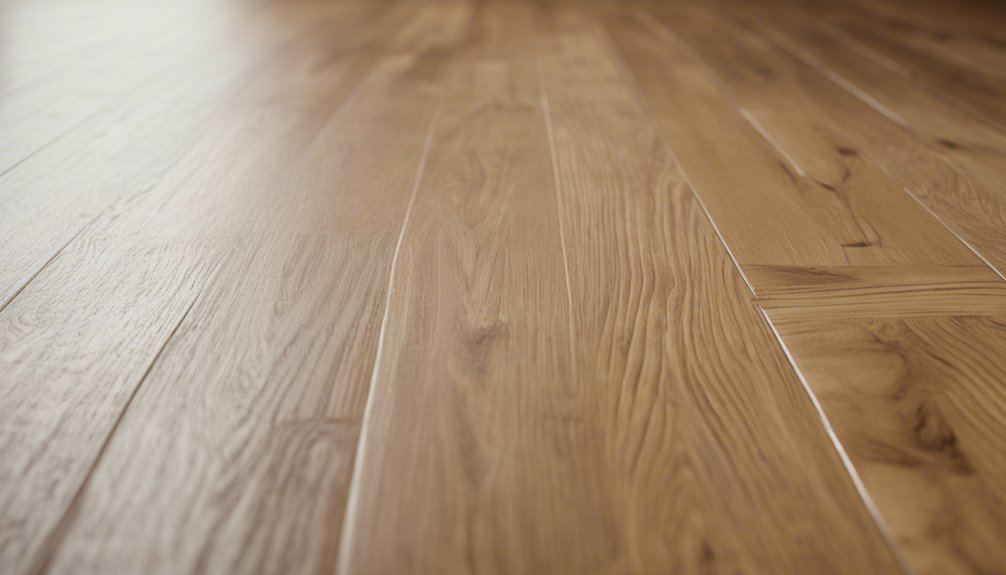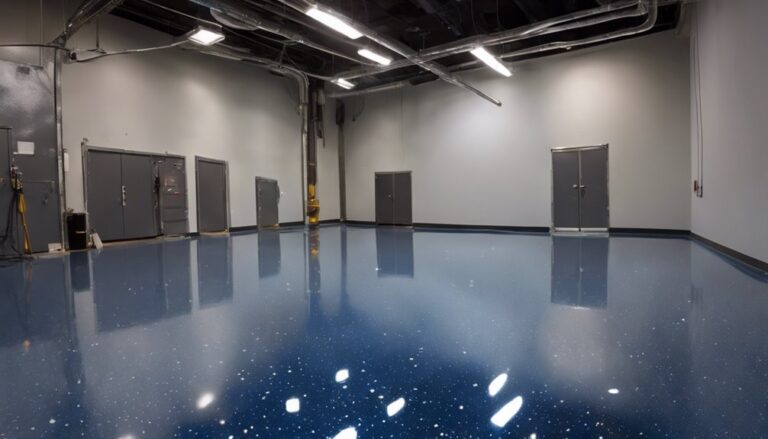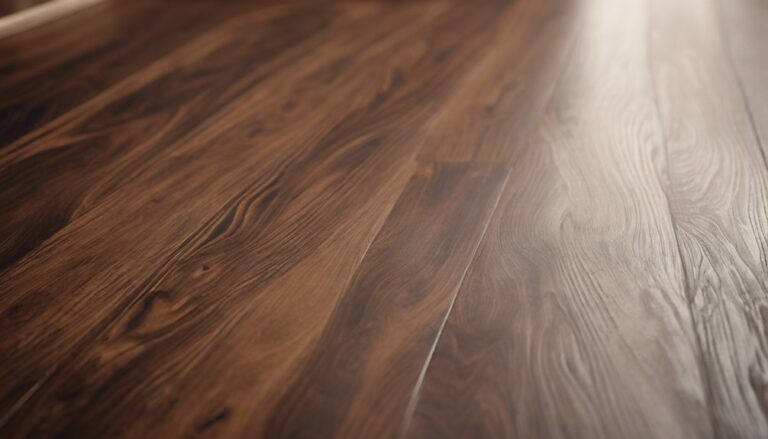Vinyl flooring generally ranges from $2 to $7 per square foot, but luxury vinyl can cost between $3 and $12. Keep in mind that installation expenses will add another $1 to $3 per square foot. The total cost varies depending on the type of vinyl you choose and factors like quality and thickness. Budget options might save you money upfront but could lack longevity. If you're considering all this for your home, it's a good idea to compare different styles and get multiple quotes for installation. By exploring further, you'll uncover more details that can help with your decision.
Types of Vinyl Flooring
When exploring options for your home, you'll find that vinyl flooring comes in several types, each with its own unique features and benefits. One popular option is luxury vinyl, which offers a high-end look and feel while remaining durable and water-resistant. It's perfect for homeowners who want a stylish yet practical flooring solution.
Another type is rigid core vinyl, designed with a sturdy backing that adds stability and minimizes the need for underlayment. This type is ideal for areas with high foot traffic or moisture. Both options provide easy maintenance and a wide range of designs, allowing you to express your personal style without sacrificing functionality. Choosing the right type can give you the freedom to create the perfect environment in your home.
Cost Per Square Foot
Choosing the right type of vinyl flooring not only impacts the aesthetic of your space but also affects your budget. When you look at cost per square foot, you'll find vinyl pricing trends vary widely, typically ranging from $2 to $7. It's essential to do a cost comparison across different styles and brands. For instance, luxury vinyl planks may be pricier upfront but could save you money in the long run due to their durability. On the other hand, budget options can help you stay within your limits, but they might not offer the same longevity. Always consider your lifestyle and how much foot traffic your flooring will endure before making a final decision.
Factors Affecting Pricing
Although vinyl flooring can be an affordable option, several factors influence its pricing. First, the quality of the vinyl plays a significant role; higher-quality materials typically cost more but offer greater durability. Then there's the environmental impact of production—eco-friendly options may carry a premium price tag. Market trends also affect costs; when demand is high, prices can rise. Additionally, the type of design, such as printed or 3D textures, can lead to price variations. You should also consider thickness and wear layer, as these features can enhance longevity but may increase the overall cost. By understanding these factors, you can make a more informed decision when choosing vinyl flooring that meets your needs and budget.
Installation Expenses
When considering vinyl flooring, it's crucial to factor in installation expenses. You'll encounter labor costs, which can vary based on your location and the complexity of the job. Additionally, there may be extra material expenses for things like underlayment or adhesives that you'll need to account for.
Labor Costs Breakdown
Understanding the labor costs involved in vinyl flooring installation is essential for budgeting your project effectively. Labor wages can vary considerably based on your location and the installer's experience. On average, you might expect to pay between $1 to $3 per square foot for installation.
Different installation techniques, like glue-down or loose lay, can also impact labor costs. For instance, glue-down methods often require more time and expertise, leading to higher labor expenses.
It's wise to get quotes from several professionals to ascertain you're getting a fair deal. Remember to ask about their experience with vinyl flooring specifically, as skilled installers will not only save you time but will also enhance the longevity of your flooring.
Additional Material Expenses
Aside from labor costs, you'll also need to factor in additional material expenses when budgeting for your vinyl flooring project. Here are some key costs to take into account:
- Underlayment options: Depending on the type you choose, this can vary widely in price and quality.
- Adhesive types: Different adhesives can impact durability and moisture resistance, so pick wisely.
- Transition strips: These are essential for seamless movement between different flooring types.
- Baseboards or trim: Don't forget to account for any necessary updates to your walls.
Maintenance and Longevity
To keep your vinyl flooring in top shape, you'll want to adopt some regular cleaning practices and know how to address any damage that may occur. Understanding the lifespan expectations of vinyl can help you make informed decisions about maintenance and repairs. Let's explore these aspects to guarantee your flooring lasts as long as possible.
Regular Cleaning Practices
Regular cleaning practices are essential for maintaining the beauty and longevity of your vinyl flooring. By establishing effective cleaning routines, you'll keep your floors looking fresh and vibrant. Here are some practical maintenance tips to follow:
- Sweep or vacuum regularly to remove dirt and debris.
- Mop with a gentle cleanser to avoid damaging the surface.
- Wipe up spills immediately to prevent staining.
- Use coasters or mats under furniture to minimize scratches.
Incorporating these simple steps into your routine will guarantee your vinyl flooring remains in top condition. Plus, it'll save you time and effort in the long run, giving you the freedom to enjoy your space without worry! Remember, consistency is key to preserving your floor's appeal.
Damage Repair Options
Even with diligent cleaning, vinyl flooring can still suffer from damage over time. To keep your floors looking great, you should know some effective repair techniques. For minor scratches, using a vinyl floor repair kit can help; simply apply the filler and smooth it out. If you have deeper gouges, consider replacing the damaged planks to guarantee a seamless look.
For dents, you can use a heat gun to gently lift the flooring back into place. To prevent future damage, use furniture pads under heavy items and avoid dragging furniture across the floor. Regular maintenance and prompt repairs not only enhance your flooring's appearance but also extend its longevity. Taking these steps lets you enjoy your vinyl flooring for years to come.
Lifespan Expectations
While the lifespan of vinyl flooring can vary based on quality and maintenance, you can generally expect it to last between 10 to 20 years. To maximize your flooring's vinyl durability and guarantee you enjoy its benefits longer, consider these key factors:
- Quality of material: Higher quality products typically last longer.
- Installation: Proper installation helps prevent future issues.
- Regular maintenance: Routine cleaning and care can enhance longevity.
- Environmental conditions: Avoid excessive moisture or direct sunlight to prevent damage.
Comparing Vinyl With Other Flooring
When you're considering flooring options, it's essential to compare vinyl with other materials like hardwood, laminate, and tile. Each has its own vinyl advantages that can influence your flooring choices.
Here's a quick comparison:
| Material | Durability | Cost |
|---|---|---|
| Vinyl | High | Low |
| Hardwood | Moderate | High |
| Laminate | Moderate | Medium |
| Tile | High | Medium |
Vinyl stands out for its affordability and resistance to moisture, making it a smart choice for various rooms. Hardwood offers timeless beauty, but at a higher price and maintenance. Laminate is a budget-friendly alternative, while tile is durable but can be cold underfoot. Consider these factors when making your decision!
Budgeting for Your Project
Budgeting for your vinyl flooring project involves several key factors to guarantee you stay within your financial limits. Here are some budgeting tips to help you with your project planning:
- Material Costs: Research different vinyl options to find the right balance of quality and price.
- Installation Fees: Consider whether you'll DIY or hire professionals; each has distinct costs.
- Underlayment and Accessories: Don't forget to budget for any necessary extras like adhesives or underlayment.
- Contingency Fund: Set aside a percentage of your budget for unexpected expenses during the project.
Frequently Asked Questions
Can I Install Vinyl Flooring Over Existing Floors?
Yes, you can install vinyl flooring over existing floors, but proper floor preparation is essential. Make sure the surface is clean, dry, and level to avoid complications later. Depending on your chosen installation methods, you might need to use an underlayment for added cushioning and soundproofing. Remember, the smoother the existing floor, the better your new vinyl will look and perform. So, take your time with preparation for the best results!
How Does Vinyl Flooring Impact Home Resale Value?
Imagine walking through a home where the floors sing with style and durability. Vinyl flooring can enhance your home's resale value, creating an enchanting dance of flooring aesthetics that potential buyers appreciate. When considering resale, think about how this flooring choice aligns with current trends and buyer preferences. Its easy maintenance and variety of designs can make your home more appealing, giving you a distinct advantage in the competitive real estate market.
Is Vinyl Flooring Eco-Friendly?
When considering if vinyl flooring is eco-friendly, you should be aware of sustainability concerns surrounding its production and disposal. While some vinyl options contain recycled materials, not all products are created equal. Look for brands offering recycling options to minimize environmental impact. It's important to balance durability with eco-friendliness, so you can enjoy your flooring while making mindful choices for a greener home. Always research specific products to find the best fit for your values.
What Are Common Brands of Vinyl Flooring?
So, you think picking a vinyl flooring brand is as easy as choosing between coffee or tea? Well, think again! You've got luxury vinyl brands like Shaw and Karndean, which scream elegance, and then there are budget options like TrafficMaster, perfect for those who want style without breaking the bank. Whether you're going for high-end chic or practical savings, there's a brand out there that'll fit your freedom-loving floor dreams!
Can Vinyl Flooring Be Used in Outdoor Spaces?
Yes, you can use vinyl flooring in outdoor spaces, but you should consider durability factors first. Not all vinyl is designed for outdoor use, so look for products specifically labeled as outdoor-friendly. These options can withstand temperature fluctuations and moisture. Additionally, think about outdoor aesthetics; choose colors and patterns that complement your landscape. With the right selection, you can enjoy a stylish and practical outdoor area that enhances your freedom to entertain or relax.




